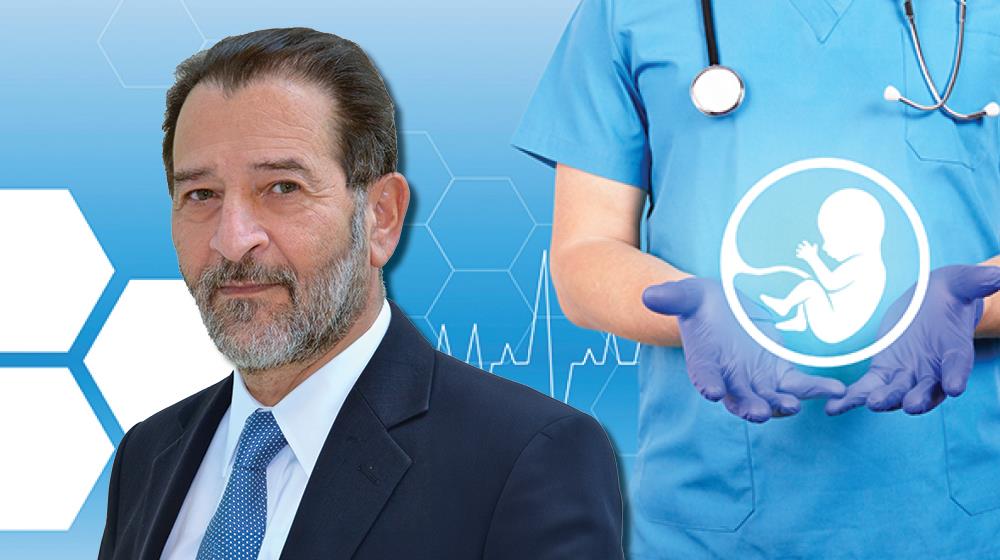The recognised global expert in fetal medicine, Professor Kypros Nicolaides, talks about his ongoing efforts to promote the best possible care of mothers and babies around the world and reveals why Cyprus, which he left for the UK many years ago, will always have a special place in his heart.
Having dedicated his life’s work to saving millions of people around the world and creating a legacy that will go on to save countless more, Professor Kypros Nicolaides still clearly remembers the moment he first appreciated the once largely untapped potential of fetal medicine.
How it all started
Speaking from his London office, Nicolaides recalls: “I was at the end of my medical studies at King's College Hospital in London and still not at all certain as to what I wanted to specialise in. Then a new professor arrived and, in his inaugural lecture, he spoke about this new technology – ultrasound.”
Impressed by the Professor’s enthusiasm and vision, Nicolaides approached him after the end of the lecture and asked whether he could observe ultrasound scanning for a few days. “When I first saw the images, saw the moving pictures on the screen, I immediately fell in love with this new area of fetal medicine,” he reveals, “because for millions of years, there had always been a distance, an iron curtain, that separated prenatal from postnatal life.”
Indeed, for him, until that moment, life began at the time of birth.
“I had witnessed deliveries before,” he says. “I would see a baby coming out; it looked quite bluish and then, a sudden cry and it became pink and that was the beginning of life. But when I saw those ultrasound images, I realised that life begins before birth. We could now access the unborn baby, we could develop methods by which we could see how it was growing, when things went wrong, what the relationship between the mother and the baby was and what happened when there was a conflict of interest between the two.” All this, in turn, led to a crucial question: ‘If there were fetal problems, could doctors now intervene and prevent babies from dying and even improve their condition?’
“All of these questions went through my mind – practical medical questions, ethical questions, philosophical questions – and it was at that moment that I fell in love with this previously non-existent field of medicine. It was the moment at which I decided to devote my life to the examination of the baby before birth,” Nicolaides says.
He has since saved countless lives and built an international reputation
He has since saved countless lives and built a reputation that has earned him renown far beyond the shores of Cyprus and his adopted home of the UK. Nicolaides is still moved at being able to help and, sometimes even years later, being reacquainted with the babies he once treated.
“We have successes and failures,” he admits. “You have people that come in at the end of the line, when they have been told at other hospitals that there is no hope for their babies, that they will die or be born with serious problems. So, they come in with the expectation that we can perhaps perform miracles and prevent the death or the handicap of their babies. Quite often we are successful but at other times we are not,” he explains.
This continuous wave of happiness and distress is intercepted by parents bringing in their now-thriving children, Nicolaides goes on, “And this is the most wonderful feeling that makes all the sadness of the failures go away. When you see somebody looking healthy and well and they tell you, ‘Thank you, I owe my life to you’, there is nothing more rewarding that anybody could possibly feel in any area of life. And this happens to me quite often.”
In recent years, Prof. Nicolaides has also begun meeting women, now going through a pregnancy of their own, whom he had treated when they were babies themselves. “They tell me, ‘You know, you examined my mother when I was a fetus 30 years ago.’ I often joke with them and say ‘Come on, I am not that old! 30 years ago, I was still a boy in Cyprus!’ But it is indeed a wonderful feeling to see this next generation coming through,” he reveals.
The Fetal Medicine Foundation
A project that also remains close to Nicolaides’ heart is The Fetal Medicine Foundation which he set up in 1995.
“When we were developing this new field of fetal medicine in the 1980s and 1990s – we were diagnosing problems in-utero, we were developing methods to prevent fetal deaths and improve the condition of the babies – it became very obvious to me that we could not have a significant impact if we confined ourselves to providing a service for a small group of patients in London or even in the whole of England,” he says. “It then became my passion to pass on knowledge to as many people in the world as possible because I felt that, especially in developing or underdeveloped countries, there was an even greater need for us to help improve the outcome,” he elaborates.
Nicolaides notes that a woman dies somewhere in the world every minute as a result of pregnancy and its complications. “And for every woman who dies, there are many, many hundreds of babies that lose their lives because of pregnancy complications. So, it became my mission to improve the standard of care throughout the world.”
The Fetal Medicine Foundation, a registered charity, receives most of its funding from the Fetal Medicine Centre that Nicolaides himself established. “We give 70-80 scholarships to doctors from all over the world so, every year, we have hundreds of people visiting us. We have had two-year fellowships for many, many people and hundreds of them have now been trained. And, more recently, I started setting up centres in different countries where, in collaboration with the local health ministries, I develop a fetal medicine centre in the major university hospital in the country’s capital city,” he explains.
“We have now established such centres in Armenia, North Macedonia, Albania, Kosovo, Moldova – very poor, underdeveloped or developing European countries – and in Ethiopia, Rwanda and Zimbabwe. We are also supporting a major project in Sierra Leone, promoting the travel of personnel to the local villages to provide the right level of care from the beginning of the pregnancy. It is extremely important to do that for these poor countries,” he says.
In addition, hundreds of doctors have been trained in Greece, Romania, Bulgaria, Poland, Germany, Russia and Turkey, among other developed countries.
“So, this is my life and it is pretty fulfilling in terms of examining pregnant women and trying my best to improve their outcome, continuing and promoting research. We have been very active in this to improve the methods of care for pregnant women and their unborn babies and I’m still passionate about educating as many people in the world as possible,” Nicolaides states.
Continuing to embrace technology
Since it was innovative technology that first sparked his interest in his area of expertise, it is no surprise to learn that he continues to embrace it.
“Artificial Intelligence (AI) is now of major importance in all aspects of our life,” he says. “It is here to stay and expand and it is also finding its way into many aspects of medicine. For example, in terms of training people to conduct ultrasound scans, with AI, it is possible to shorten the training period and improve the standard of training,” he suggests.
Nicolaides is also involved in the development of new methods of predicting, from the beginning of the pregnancy, whether women are at high risk of having stillbirths or developing preeclampsia, which is responsible for many maternal and fetal deaths around the world. “We are using new techniques and new technologies but we are also working closely with mathematicians to develop mathematical models,” he reveals. “We are working with computer people to put into practice and develop simple apps – which I am financing – that will be given to doctors free of charge throughout the world to improve their own care of their patients,” he continues.
The Cyprus connection
Moving on to another aspect of his life – his connection with Cyprus – Nicolaides notes that he grew up during an extremely difficult time in the island’s history.
“My early years were spent during the armed struggle for the liberation of Cyprus. My father was a leader of the liberation movement and he spent many years in a concentration camp. So from the age of two to five, I grew up without my father, knowing that he was in prison. When Cyprus gained its independence, my father was a doctor and a politician but then came the very sad period of intercommunal fighting between the Greek and Turkish Cypriots and the division of Cyprus,” he recalls.
The next significant event in his life was leaving his family in Paphos to attend boarding school in Nicosia, “And then, at the age of 17, I arrived in England,” he reminisces. That was in the early 1970s, he notes, “when we had problems in Cyprus and, eventually the coup and the subsequent Turkish invasion.”
While studying in England, Nicolaides remained close to the developments at home, first through his family and then through his student activism. “I was very actively involved in demonstrations against the dictatorship in Greece and those in many other countries. In the 1970s, there were also dictatorships in Turkey, Spain, Portugal and in Latin America, plus apartheid in South Africa,” he elaborates.
Nicolaides’ experiences as a student were a constant reminder of who he was and where he came from, and he is still aware of this today, even though the island is vastly different from the one he left behind at 17.
“I always remember my roots and I feel very close to my country. I have witnessed the suffering of the people, the economic hardships and the developments of Cyprus, the good and the bad. So, I remain a true Cypriot,” Prof. Nicolaides concludes.
This article was first published in the first edition of MHV Group’s special publication MHV Moments. To view it, click here. To read the entire publication, click here.









